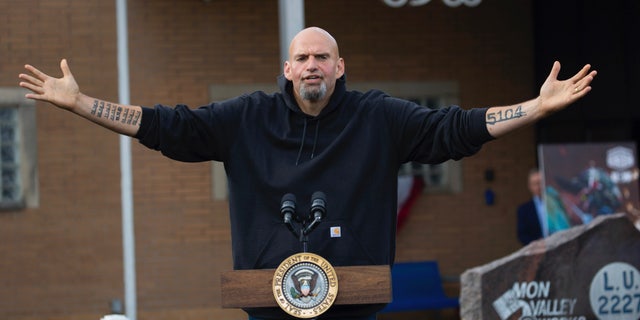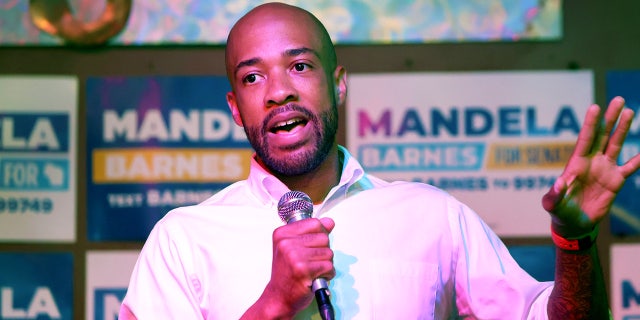NEWYou can now listen to Fox News articles!
With just under nine weeks to go until November’s midterm elections, the top non-partisan political handicappers point to a toss-up between the Democrats and Republicans in the battle for the Senate majority.
The Senate is currently split 50/50 between the two major parties, but the Democrats control the majority thanks to the tie-breaking vote of Vice President Kamala Harris. That means the GOP needs a net gain of just one seat to regain the majority they lost when they were swept in the Jan. 5, 2021, twin Senate runoffs in Georgia.
The Republicans are defending 21 of the 35 seats up for grabs in November, including five seats held by retiring Republicans. And three of those open seats are in the general election battlegrounds of Pennsylvania and North Carolina and the competitive state of Ohio.
At the start of the summer, Republicans were energized as they pushed to regain the House and Senate majorities, enjoying historical headwinds (the party that wins the White House traditionally suffers setbacks in the ensuing midterm elections) as well as a favorable political climate fueled by skyrocketing gas prices, record inflation, soaring crime, and parents discontent with their children’s schools following pandemic shutdowns.
FINAL SPRINT FOR CONTROL OF CONGRESS AND STATE GOVERNMENTS UNDERWAY
But Democrats seem to have regained momentum, following a string of ballot box successes this summer in the wake of the blockbuster move by the Supreme Court’s conservative majority to upend the landmark Roe v. Wade ruling and send the combustible issue of legalized abortion back to the states. And the summer-long easing of gas prices, a string of major legislative victories for Democrats in Congress, and President Biden’s rising (but still underwater) approval ratings have inflated Democrats’ optimism.
Also distracting Republicans from keeping the spotlight on what they see as the Democrats failure in handling the economy, crime, border security and other top issues is former President Donald Trump, who has dominated political headlines thanks to the House select committee’s investigation into the Jan. 6, 2021, attack on the U.S. Capitol by right wing extremists and other Trump supporters amid congressional certification of Biden’s 2020 Electoral College victory, and courtesy of the FBI search last month of Trump’s Mar-a-Lago residence in Florida for classified materials.
The past few months also witnessed Democratic Senate candidates and groups mostly out raise their GOP counterparts and dominate the airwaves with campaign commercials. And a recent war of words between longtime Senate Republican leader Sen. Mitch McConnell of Kentucky and Sen. Rick Scott of Florida, the chair of the National Republican Senatorial Committee, over the quality of some GOP Senate nominees did the party no favors.
CHECK OUT THE LATEST FOX NEWS 2022 MIDTERMS POWER RANKINGS
But Republicans are starting to fight back.
The McConnell-aligned Senate Leadership Fund, the top super PAC backing Republican Senate incumbents and candidates, on Tuesday launched a massive nine-figure ad blitz in five key Senate battlegrounds — Georgia, Nevada, Wisconsin, North Carolina and Ohio, as well as continuing its spots in the swing state of Pennsylvania. The group’s strategy: to portray Democratic incumbents and candidates as too far to the left and tie them to Biden and the continued high prices Americans are paying.
Here’s a look at the 11 Senate races that will likely determine if the chamber’s majority will flip from blue to red.
PENNSYLVANIA (Republican controlled open seat)
Despite being sidelined for three months after suffering a stroke just head of the Keystone State’s mid-May primary, Pennsylvania Lt. Gov. John Fetterman, the Democratic nominee, retains the lead in both public opinion polling and fundraising.

Pennsylvania Lt. Gov. and Democratic Senate nominee John Fetterman speaks to a crowd gathered at aa United Steel Workers of America Labor Day event with President Joe Biden in West Mifflin, Pa., just outside Pittsburgh, Monday Sept. 5, 2022. (AP Photo/Rebecca Droke)
(AP)
Fetterman, the tough talking, unconventional candidate and former mayor, known for wearing shorts and hoodies, grabbed plenty of attention this summer with his social media jabs at opponent Mehmet Oz — the celebrity doctor and cardiac surgeon — for his New Jersey roots and love of crudité.
Oz, following a bruising primary that went into overtime, has yet to fully consolidate the GOP base in the state, but a rally headlined by Trump this past weekend will help put concerns about Oz’s conservative credentials to rest. And the one-time star of the nationally known “Dr. Oz Show” has gone on the attack in recent weeks over Fetterman’s unwillingness to commit to a debate schedule as he continues to recover from his stroke.

Republican U.S. Senate candidate Mehmet Oz holds a rally in the Tunkhanock Triton Hose Co fire station in Tunkhanock, Pa., on Thursday, August 18, 2022.
(Bill Clark/CQ-Roll Call, Inc via Getty Images)
Fetterman, who came under attack by Oz for failing to join President Biden last week during the president’s stop in eastern Pennsylvania, teamed up near his hometown outside Pittsburgh with Biden on Labor Day.
GEORGIA (incumbent: Democratic Sen. Raphael Warnock)
The Peach State, once a reliably red state, was one of six states, along with Pennsylvania, that Biden narrowly won in the 2020 presidential election. Two months later, Democratic Sen. Raphael Warnock edged then-Sen. Kelly Loeffler in a special runoff election to fill the final two years of former Republican Sen. Johnny Isakson’s term.
Republicans view Warnock, the senior pastor at Atlanta’s Ebenezer Baptist Church, where Martin Luther King Jr. used to preach, as very vulnerable as he runs for re-election to a full six-year term. But Warnock has dramatically outraised Republican nominee Herschel Walker to date and holds a slight edge over his GOP challenger in an average of the latest public opinion surveys.

Georgia GOP Senate nominee Herschel Walker and Democratic incumbent Sen. Raphael Warnock
(Republican National Convention/Handout via REUTERS | Tom Williams/Pool via REUTERS)
Walker, who won a Heisman Trophy and helped steer the University of Georgia to a college football national championship four decades ago, jumped into the GOP race to face off against Warnock last summer after months of support and encouragement to run for the Senate by Trump, his longtime friend.
HERSCHEL WALKER, SEN. RAPHAEL WARNOCK SQUABBLE OVER DEBATES IN GEORGIA SENATE RACE
Thanks to his legendary status among many in Georgia and his immense, favorable name recognition in the Peach State, Walker trounced a field of lesser-known GOP primary rivals, but the first-time candidate seemed unprepared at first for the incoming fire he quickly received immediately after the May primary.
WISCONSIN (incumbent: Republican Sen. Ron Johnson)
Democrats view Johnson, who was first elected in the Tea Party wave of 2010 and who’s become a strong supporter of Trump and his repeated re-litigating of his 2020 election loss, as the most vulnerable Republican running for re-election this cycle. Johnson’s facing a Democratic challenge from Lt. Gov. Mandela Barnes in a crucial midwestern battleground that Biden narrowly captured two years ago.

Wisconsin Lieutenant Governor Mandela Barnes is running to become the Democratic nominee for the U.S. senate
(Scott Olson/Getty Images)
While Johnson enjoys a fundraising advantage over Barnes, the incumbent trails his challenger in the latest polls. But his campaign and allied Republicans have become aggressive in recent weeks in attacking Barnes and tying him to the left-wing of the Democratic Party, including the “squad” of House progressives.
NEVADA (incumbent: Democratic Sen. Catherine Cortez Masto)
Biden won Nevada by just two points, and in a state with a sizable Spanish-speaking electorate — where the GOP’S made gains in recent cycles — Republicans view the freshman Democratic senator as vulnerable.
But Cortez Masto, the first Latina elected senator, has run a solid campaign to date and has easily outraised Republican challenger Adam Laxalt, a former state attorney general whose grandfather Paul Laxalt served as Nevada’s governor and senator.
ARIZONA (incumbent: Democratic Sen. Mark Kelly)
In another southwestern state with a large Spanish speaking voting population which Biden narrowly carried in 2020, first-term Democratic Sen. Mark Kelly enjoys large fundraising and polling leads over GOP nominee Blake Masters.
In a state that neighbors Mexico, Kelly has spotlighted his differences with the White House over the crucial issue of border security, which has partially buffered the senator from near constant attacks by Masters and fellow Republicans over the issue of illegal immigration.
REPUBLICAN SENATE CANDIDATES HIT BACK ON ABORTION ATTACK ADS FROM DEMOCRATS
Masters, a strong supporter of Trump’s unproven claims that the 2020 presidential election was “rigged” and “stolen,” appears to have moderated his hardline stance on another key issue — abortion — since his GOP primary victory last month.
NEW HAMPSHIRE (incumbent: Democratic Sen. Maggie Hassan)
Republicans have long viewed Hassan, a former governor and first-term senator, as beatable as she runs for re-election this year, thanks in part to her lackluster approval ratings in the small but crucial New England battleground state.
But due to a field of little-known and marginally funded Republican challengers and a late primary that will be held next Tuesday (Sept. 13), and also thanks to her strong fundraising and spotlighting of her differences with the president at times, Democrats are confident that Hassan will be able to win a second term in the Senate.
Republicans though, have not given up on New Hampshire, with the Senate Leadership Fund — as first reported by Fox News — announcing last week that it was spending $23 million to run ads attacking Hassan in the general election campaign.
NORTH CAROLINA (Republican controlled open seat)
Republican Rep. Ted Budd has the very slight edge in the latest polling, but former state Supreme Court chief justice Cheri Beasley, the Democratic nominee, enjoys a solid fundraising lead, in the race to succeed retiring GOP Sen. Richard Burr in a state Trump narrowly carried in 2020.
OHIO (Republican controlled open seat)
Longtime populist Democratic Rep. Tim Ryan has run a strong campaign to date, staying extremely competitive with GOP nominee JD Vance in a state Trump carried by eight points in the 2016 presidential election victory and his 2020 re-election defeat
FLORIDA (incumbent: Republican Sen. Marco Rubio)
Democratic nominee Rep. Val Demings, a former Orlando police chief, has consistently out raised Sen. Marco Rubio. But the two-term Republican senator enjoys an advantage in the latest polls in a state that’s increasingly turned from purple to red the past couple of election cycles.
COLORADO (incumbent: Democratic Sen. Michael Bennet)
Once a battleground state, Colorado has leaned blue for nearly two decades and Biden captured the state by 13 points in the 2020 presidential election. But following the victory by moderate Joe O’Dea — a construction company owner — in the late June GOP primary, Republicans have become increasingly optimistic that they can flip Democratic Sen. Michael Bennet’s seat from blue to red.
CLICK HERE TO GET THE FOX NEWS APP
WASHINGTON STATE (incumbent: Democratic Sen. Patty Murray)
Democratic Sen. Patty Murray, who was first elected to the Senate in 1992, won re-election in 2016 by 18 points in reliably blue Washington. But Republicans are confident that nurse, military wife, and veterans rights advocate Tiffany Smiley has a shot at upending Murray and turning the blue seat red.